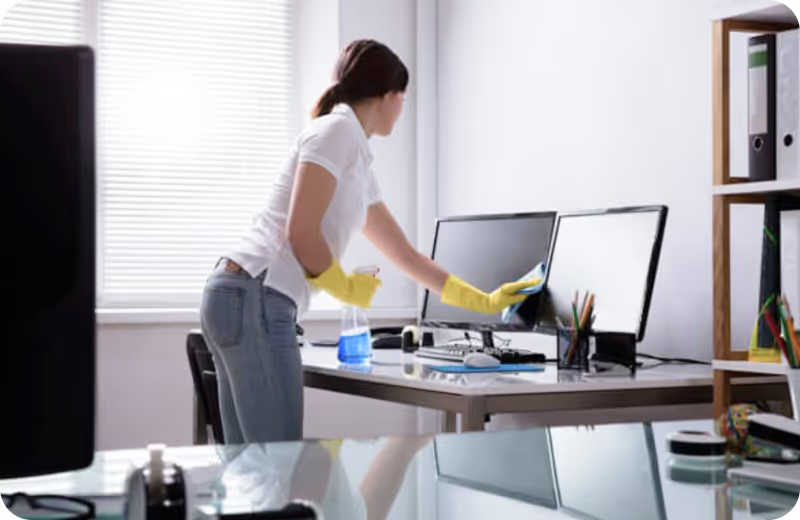
Those reddish-brown streaks in your bathroom aren’t blood or mold; they’re rust stains! Rust stains are notoriously difficult to remove, especially when the source of the stains are still forming rust to grow around your bathroom fixtures.
Rust stains are difficult to clean since the majority of the time, these stains are embedded deep within the material of your bathroom walls, showers, tubs, and other surfaces. In this guide, we’ll present the different ways you can remove rust from your bathroom, as well as a few tips to prevent and remove rust from your fixtures.
Take note that rust can pose health risks, so wear protective gear when dealing with the matter. Some cleaners can also be corrosive to the skin, so wear a proper pair of waterproof gloves to minimize the risks.

What Causes Rust in Bathroom?
Rust stains come from, well, rust. Rust can form on any metal material that has been exposed to water, like pipes and bathroom fixtures. Since our bathrooms are loaded with metal pipes, poles, and fixtures, they are most susceptible to rust formation.
Rust is made from iron oxide, which is the metal formed from the reaction of water and metal. You can also introduce rust into your bathroom when you leave a metal item, such as a nail, a metal necklace, or tweezers, in moist areas in your bathroom. These items, when left untouched, develop rust over time that can stain surfaces.
Metal pipes that have not been used in a long time can also create a long trail of rust stain on the walls and ceilings of your bathroom. Pipes typically get special coatings to prevent rust stains, but these can dissolve away over time. Leaks can also form rust, staining any material the water passes through.

How to Remove Rust Stains from Bathroom Surfaces
Like we’ve mentioned before, rust stains are infamous for being difficult to remove. One reason why removing rust stains is so tricky, is that the main enemy of rust is acid, which can corrode not only the rust stains, but also the materials commonly used in bathrooms.
However, by using mildly acidic solutions and diluted acidic mixtures, we can safely remove rust stains while keeping the material of your bathroom surfaces and fixtures intact. You may need to use a little elbow grease to fully remove the stains, but the results will be worth it!
It is important to note that exposure to rust can be harmful to your health. If you have a compromised immune system, or have known allergies to certain metals, we suggest you let a professional tackle the rust problem instead of doing it yourself. Rust can also cause tetanus when in contact with an open wound, so best to protect yourself with gloves and gear.
Bathtub
A bathtub would normally get stains from rust when the metal fixtures around the tub are allowed to submerge in water. Rust can also appear on metal candle holders used for scented candles, or the metal chain on the bathtub drain stopper. There are a multitude of reasons why bathtubs can get rust easily due to the nature of usage of the bathtub.
A simple mixture of lemon juice and salt can remove rust particles for a clean finish. Wet the area of your bathtub, especially around where the rust stains are most prominent, and apply a layer of fine table salt or rock salt. Cut a lemon in half, and squeeze the lemon juice all over the rust particles. Let it sit for a few minutes for the acid to dissolve the rust.
Use the half lemon slice as a scrubber, and start scrubbing out the rust stains. Put some elbow grease into it, as you scrub clean rust stains from the smooth surface of your bathtub. Go in circular motions to prevent scratching your bathtub. The lemon juice dissolves metal particles, while the salt acts as an abrasion to remove deep-seated stains.
Sink
The sink is one of the areas in the bathroom most susceptible to rust, as we tend to place things on top of our countertops. When we place costume jewelry, tweezers, nail clippers, and similar metal items on our countertops, the moisture from everyday washing can create rust which can trail off to the sink.
The sink can also get stains from rusted faucets, drain covers, and pipes. Removing rust from the sink requires fast action, as the sink is constantly being used throughout the day. Reach for a commercial rust remover that can remove stains from your bathroom sink to remove rust.
Follow the instructions on the bottle to ensure you are using the product safely and effectively. Some solutions can offer a protective layer to prevent rust stains and future stains from common bathroom grime.
Toilet
Toilet cleaning is always a messy job, but you can make it easier by using another surprising rust remover: Coca-cola! Yes, that popular summertime beverage has more uses than quenching the thirst of scarf-wearing polar bears, it contains mild acids that are also used in commercial rust removers, though in smaller quantities.
Phosphoric acid is one of the main acids found in Coca-cola, but its food grade quantity makes it weaker than commercial rust removers. When given enough time, however, Coca-cola can remove all sorts of stains like mineral deposits, soap scum, and even rust!
Coca-cola also contains carbonation and citric acid that help in the rust removal process. To use Coca-cola to clean rust stains from your toilet, simply pour a liter or two of Coca-cola down your toilet. Let the soda sit overnight, and don’t use the toilet while you do. Use the toilet brush to blindly scrub where you suspect the stains are, then flush the toilet to rinse the bowl.
Shower
Removing any sort of stain in the shower area can be tricky, as showers tend to have more vertical wall surfaces than horizontal. Cleaning solutions tend to trail down the shower walls before they can do any sort of cleaning.
For rust stains in your shower area, first wipe the entire area dry. Take some distilled white vinegar, and place some in a spray bottle for easy application. Spray liberally all over the shower area, particularly where the rust stains are concentrated, and let it sit for 30 minutes.
Use a firm scrubbing brush to scrub away the rust stains. Rinse thoroughly afterwards, and inspect your shower area for the source of the rust. If you determine that the rust is coming from the pipes inside the walls, then you will need to call for professional renovators to replace the rusted pipes.
Bathroom Counter
If you don’t have the habit of wiping down your bathroom counter every time you wash your hands, stains can appear from rusted metal fixtures around the area. Baking soda and hydrogen peroxide creates a powerful paste that can remove stains from your bathroom counter.
Mix together enough baking soda and hydrogen peroxide to form a paste, and apply to areas where there are stains from rust. Let it sit for a few minutes; time varying based on how much paste you apply, and gently scrub using a damp cloth.
The baking soda provides a gentle abrasive that removes deep-seated stains, while the hydrogen peroxide bleaches out the rust color from your bathroom counter. Re-apply the baking soda paste as needed.
Bathroom Fixtures
Finding stains on your faucet and nearby fixtures? Use ketchup as a mild rust remover! Ketchup works surprisingly well to remove rust due to its acidic nature. The thick viscosity of ketchup helps keep the solution on the fixtures, and
To clean your bathroom fixtures of rust, apply a thick layer of ketchup on anywhere there are rust stains. Let the ketchup sit and dissolve the rust for around 30 minutes to an hour, then wipe off the ketchup using a dry cloth.
For metal fixtures, it is best to wipe the fixtures completely dry, then coat the fixtures in a thin layer of oil or wax to protect them from moisture, and prevent any rust stain from forming. Remove rust from the surface first before applying the protective layer. Re-apply the protective layer monthly.
How to Prevent Rust from Bathroom Surfaces
Thorough cleaning is key in preventing stains from the bathroom, and keeping metal pieces dry ensures that rust does not form to create rust stains. There are plenty of polishing options that are commercially available to provide a protective coating for metal fixtures and surfaces in the bathroom.
Always wipe metal areas dry after every shower to prevent rust, and have your pipes checked regularly. Get professional home cleaning every now and then to keep your home in pristine condition.
Want more bathroom cleaning tips? Have more than just rust stains dirtying up your home? Head over to our blog for more tips and tricks on how to clean your home!


























